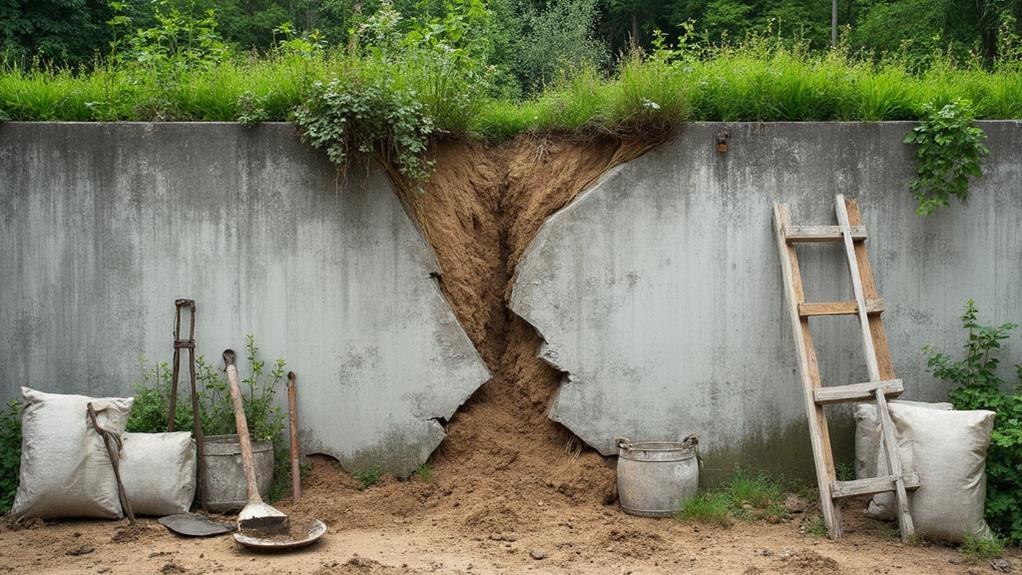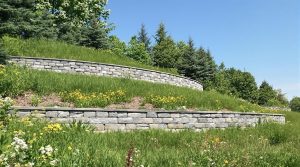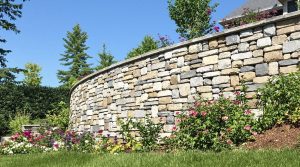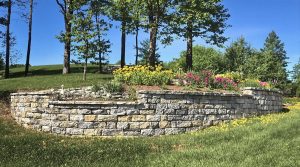Top retaining wall repair services offer detailed solutions to restore structural integrity and enhance aesthetic appeal. These services typically include thorough assessments, meticulous excavation, skilled rebuilding, and finishing touches. Reputable providers utilize advanced diagnostic tools, high-quality materials, and adhere to engineering standards and local building codes. The repair process aims to address underlying issues such as drainage problems and soil composition, while incorporating reinforcement measures like anchors or tiebacks. Professional repairs not only prevent soil erosion and mitigate collapse risks but also improve property value and landscape integration. Understanding the intricacies of material costs, labor rates, and regional factors can help property owners make informed decisions about their retaining wall repair needs.
Table of Contents
ToggleWalls Contractor Highlights
- Comprehensive assessment and planning, including thorough evaluations and tailored repair plans.
- Meticulous excavation and reinforcement techniques using specialized equipment and advanced materials.
- Skilled rebuilding and finishing, incorporating drainage systems and aesthetic improvements.
- Enhanced structural integrity and soil erosion prevention for long-term stability.
- Consideration of material costs, labor rates, and regional market conditions for accurate pricing.
Retaining Wall Repair Process
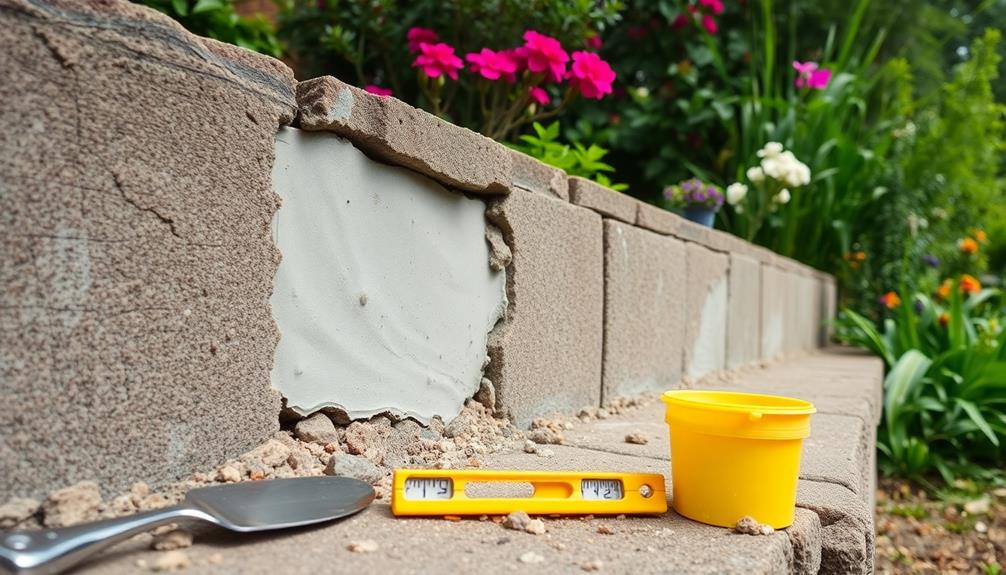
The retaining wall repair process involves several essential stages that guarantee the structure's long-term stability and functionality. Initially, a thorough assessment and planning phase is conducted, often requiring engineering expertise to address the wall's structural integrity and necessary permits. This phase may also involve discussing the best designs and materials suitable for the repair.
It is followed by careful excavation and reinforcement of the existing structure, ensuring the end results meet safety and quality standards. The final stage encompasses the meticulous rebuilding and finishing of the retaining wall, incorporating any necessary improvements or upgrades to enhance its performance and durability.
Assessment and Planning
Before undertaking any retaining wall repair project, a thorough assessment and detailed planning phase is essential. This critical step involves a comprehensive evaluation of the wall's current condition, including structural integrity, drainage issues, and soil composition. Experienced professionals conduct in-depth inspections, utilizing advanced diagnostic tools to identify underlying problems that may not be immediately visible to the untrained eye.
The assessment process typically encompasses soil testing, foundation analysis, and examination of surrounding landscaping elements that might impact the wall's stability. Based on these findings, engineers and repair specialists develop a tailored plan of action, outlining necessary repairs, materials required, and potential challenges. This meticulous approach guarantees that homeowners and property managers receive a clear understanding of the scope of work and associated costs.
The planning phase also involves obtaining necessary permits, coordinating with local authorities, and scheduling the repair work to minimize disruption to daily activities. By investing time and resources in thorough assessment and planning, clients can be confident that their retaining wall repair project will be executed efficiently and effectively, resulting in a resilient structure that will stand the test of time.
Excavation and Reinforcement
Once assessment and planning are complete, excavation and reinforcement mark the beginning of the hands-on repair process for retaining walls. This critical phase involves carefully removing soil and debris from behind the damaged wall, exposing the foundation and structural elements. Skilled technicians utilize specialized equipment to facilitate precise excavation without compromising surrounding structures or utilities. The exposed area is then meticulously cleaned and prepared for reinforcement.
Reinforcement techniques may include installing additional support structures, such as anchors or tiebacks, to enhance wall stability. Contractors often employ advanced materials like geotextiles or drainage systems to improve water management and reduce soil pressure. The existing wall may be strengthened through the application of shotcrete or the insertion of reinforcing bars. Throughout this process, experienced professionals adhere to strict engineering standards and local building codes to enable long-term structural integrity.
This phase requires precision, expertise, and attention to detail, setting the foundation for a successful retaining wall repair that will stand the test of time and protect your property for years to come.
Rebuilding and Finishing
Following excavation and reinforcement, rebuilding and finishing constitute the final stages of the retaining wall repair process. This phase involves meticulously reconstructing the damaged sections of the wall using high-quality materials that match the existing structure. Skilled technicians carefully align new blocks or stones, ensuring proper interlocking and stability. They may incorporate additional drainage systems or waterproofing measures to prevent future water damage and soil erosion.
The finishing stage is pivotal for both aesthetic appeal and long-term durability. Professionals apply specialized sealants or coatings to protect the wall from environmental factors, such as UV rays and moisture. They may also integrate decorative elements, such as capstones or veneers, to enhance the wall's appearance and seamlessly blend it with the surrounding landscape. For concrete walls, technicians may employ techniques like staining or texturing to achieve a desired look.
Throughout this process, experts pay close attention to every detail, from ensuring proper joint spacing to achieving a level surface. The final result is a structurally sound, visually appealing retaining wall that not only fulfills its primary function but also adds value to the property.
Benefits
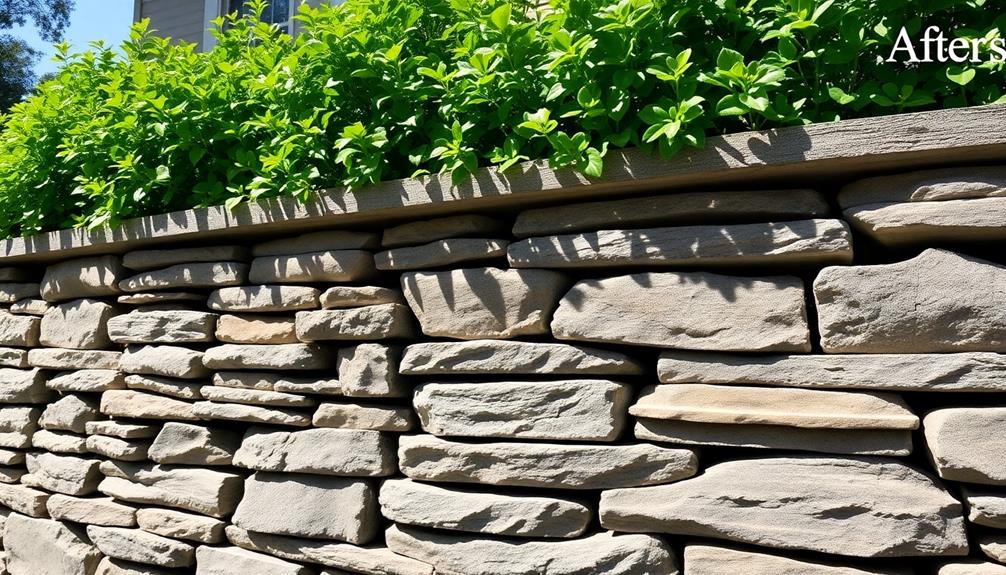
Repairing a retaining wall offers a multitude of advantages that extend beyond mere structural reinforcement. By investing in professional repair services, property owners can enhance their property's value, bolster the wall's structural integrity, mitigate soil erosion concerns, and elevate the overall aesthetic appeal of their landscape.
This is especially true when considering versatile design options that guarantee the wall complements the surrounding environment, such as those offered by boulder or limestone walls. These benefits collectively contribute to a more secure, attractive, and valuable outdoor space, confirming that the retaining wall continues to fulfill its essential function while also serving as an appealing architectural element.
Improved Property Value
A well-maintained retaining wall markedly enhances a property's overall value and curb appeal. By investing in professional retaining wall repair services, homeowners can considerably boost their property's market worth. These services not only restore structural integrity but also revitalize the aesthetic appeal of outdoor spaces.
A properly repaired retaining wall prevents soil erosion, reduces the risk of flooding, and creates additional usable land, all of which contribute to increased property value.
Consider the following emotional benefits of improved property value:
- Pride in owning a well-maintained, visually appealing property
- Confidence in the long-term investment of your home
- Relief from potential liability issues related to wall failure
- Satisfaction in contributing to neighborhood beautification
Furthermore, a professionally repaired retaining wall demonstrates a commitment to property maintenance, which can be particularly appealing to potential buyers. It showcases responsible ownership and attention to detail, factors that often translate into higher property valuations. Real estate professionals frequently cite well-maintained outdoor structures, including retaining walls, as key elements in attracting prospective buyers and commanding premium prices in competitive markets.
Enhanced Structural Integrity
Structural stability forms the cornerstone of any retaining wall repair service. By addressing underlying issues and reinforcing weakened areas, these services significantly bolster the structural integrity of retaining walls. Professional repair companies employ a range of techniques, including soil stabilization, drainage improvement, and the application of advanced materials, to fortify existing structures and prevent future deterioration.
The enhanced structural integrity provided by expert repair services offers numerous benefits to property owners. It mitigates the risk of wall collapse, safeguarding both the immediate landscape and adjacent structures. Additionally, it extends the lifespan of the retaining wall, reducing the need for frequent repairs or complete replacements. This long-term durability translates to substantial cost savings over time.
Moreover, improved structural integrity guarantees compliance with local building codes and regulations, protecting property owners from potential legal liabilities. It also contributes to overall site safety, minimizing hazards associated with unstable walls. By investing in professional retaining wall repair services, property owners can rest assured that their structures will withstand environmental pressures and continue to perform their essential functions effectively for years to come.
Prevent Soil Erosion
Beyond enhancing structural integrity, professional retaining wall repair services play a pivotal role in preventing soil erosion. These specialized services employ advanced techniques and materials to fortify the wall's ability to resist the constant pressure exerted by soil and water. By addressing issues such as inadequate drainage, compromised foundations, or deteriorating materials, repair professionals guarantee that the retaining wall continues to effectively hold back soil and prevent erosion-related problems.
Proper maintenance and repair of retaining walls offer numerous benefits for property owners:
- Preservation of landscape aesthetics and property value
- Protection of structures and vegetation from soil displacement
- Mitigation of potential safety hazards caused by wall failure
- Compliance with local building codes and regulations
The expertise provided by retaining wall repair services extends beyond mere structural reinforcement. These professionals assess the unique geological and environmental factors affecting each wall, implementing tailored solutions that address site-specific erosion risks. By incorporating improved drainage systems, utilizing erosion-resistant materials, and applying cutting-edge stabilization techniques, repair services create a robust defense against soil erosion. This all-encompassing approach not only resolves existing issues but also proactively safeguards against future erosion-related challenges, ensuring long-term stability and peace of mind for property owners.
Aesthetic Landscape Enhancement
Professional retaining wall repair services can spruce up the visual appeal of your property while bolstering its functional aspects. These services offer a range of aesthetic enhancements that transform ordinary retaining walls into mesmerizing landscape features. By incorporating decorative elements such as natural stone veneers, textured concrete finishes, or attractive brick patterns, skilled contractors can elevate the overall look of your outdoor space.
The aesthetic improvements extend beyond mere surface treatments. Experienced professionals can integrate complementary landscaping elements, such as built-in planters or cascading water features, seamlessly blending the retaining wall with its surroundings. This holistic approach creates a cohesive and visually striking environment that enhances your property's curb appeal and potentially increases its value.
Moreover, these services often include lighting solutions that accentuate the wall's architectural details and create dramatic nighttime ambiance. By carefully selecting materials and design elements that harmonize with your home's exterior and existing landscape, retaining wall repair experts guarantee that the enhanced structure becomes an integral part of your property's aesthetic identity. This attention to detail and commitment to visual excellence allows homeowners to enjoy a renewed sense of pride in their outdoor living spaces.
Cost of Materials and Labor
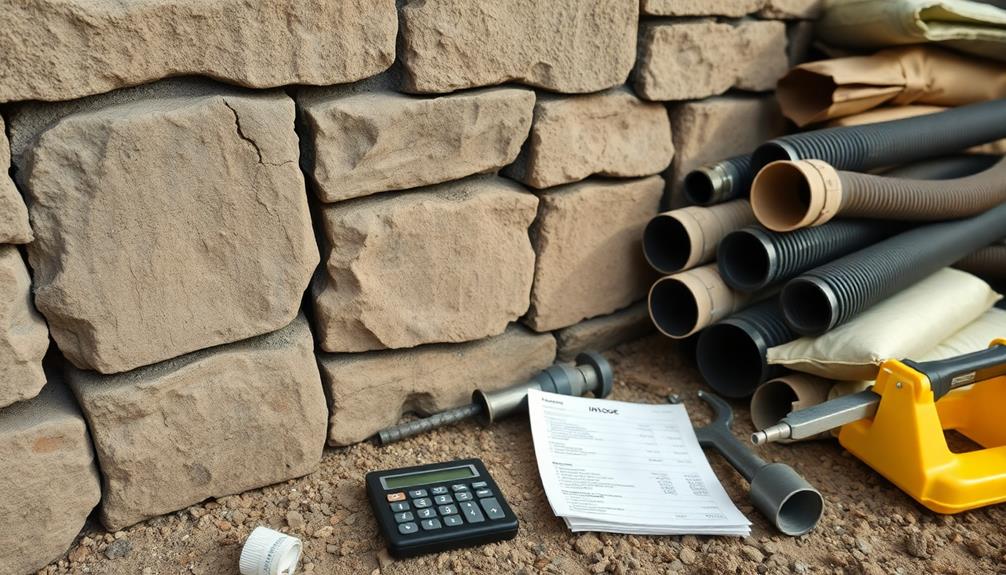
The cost of retaining wall repair services can vary considerably based on several factors, including materials, labor, and project complexity. Understanding the average material costs and labor rates can help homeowners budget effectively for their repair projects. The following table provides a comparative overview of common materials, their average costs, and typical labor rates, illustrating how these factors contribute to the overall expense of retaining wall repairs:
| Material | Average Cost (per sq. ft.) | Typical Labor Rate (per hour) |
|---|---|---|
| Concrete | $30 – $40 | $50 – $100 |
| Stone | $25 – $80 | $60 – $120 |
| Wood | $15 – $25 | $40 – $80 |
Average Material Costs
When considering retaining wall repair services, understanding the essential material costs is fundamental for budgeting and planning purposes. The average material costs can vary greatly depending on the type of retaining wall, its size, and the extent of damage.
For concrete walls, materials like cement, sand, and gravel typically range from $30 to $60 per square foot. Timber retaining walls may require pressure-treated lumber, which can cost between $15 and $25 per square foot. Stone or brick walls often involve higher material costs, ranging from $75 to $150 per square foot, due to the need for specialized masonry products.
- Investing in quality materials guarantees long-lasting stability for your property
- Proper material selection can heighten your landscape's aesthetic appeal
- High-grade materials offer peace of mind against future structural issues
- Choosing the right materials demonstrates commitment to your community's appearance
Additional factors influencing material costs include reinforcement materials such as rebar or geogrid, which can add $5 to $15 per square foot. Drainage materials, crucial for preventing water damage, may cost an extra $10 to $20 per linear foot. It is important to note that these figures represent average costs, and actual expenses can fluctuate based on regional differences, market conditions, and specific project requirements.
Labor Rates Comparison
Comparing labor rates for retaining wall repair services is essential for homeowners and property managers to make informed decisions. When evaluating different providers, it's indispensable to understand that labor costs can vary significantly based on factors such as the contractor's experience, location, and the complexity of the project. On average, skilled retaining wall repair specialists charge between $50 and $150 per hour, with rates in urban areas typically falling on the higher end of this spectrum.
To ensure you're getting the best value, request detailed quotes from multiple contractors, breaking down labor costs separately from materials. Keep in mind that the lowest rate doesn't always equate to the best service; experienced professionals may charge more but often complete work more efficiently and with superior quality results.
Additionally, some companies offer package deals that combine labor and materials, which can be cost-effective for larger projects. When comparing rates, inquire about any potential additional fees, such as equipment rental or disposal costs, to avoid unexpected expenses. By thoroughly analyzing labor rates and understanding the factors influencing them, you'll be better equipped to select a retaining wall repair service that offers the ideal balance of cost and quality for your specific needs.
Factors Affecting Pricing
Retaining wall repair's pricing is influenced by a multitude of factors, with the cost of materials and labor being the most significant. The type and quality of materials required for the repair, such as concrete, stone, or timber, can substantially impact the overall cost.
Additionally, the complexity of the repair work, including the wall's height, length, and accessibility, directly affects labor expenses. Soil conditions and drainage issues may necessitate additional reinforcement or waterproofing measures, further increasing costs.
Preserving your property's value and aesthetic appeal
Ensuring the safety of your family and neighbors
Protecting your landscape investment
Avoiding potential legal liabilities from structural failure
Market conditions and regional variations in labor rates also play a role in determining repair costs. Seasonal demand fluctuations may influence pricing, with peak periods potentially commanding higher rates. Moreover, the expertise and reputation of the repair service provider can affect pricing, as highly skilled professionals may charge premium rates for their specialized knowledge and experience. Ultimately, an in-depth on-site assessment by a qualified contractor is essential to provide an accurate estimate tailored to your specific retaining wall repair needs.
Walls Contractor FAQ
How Long Does a Typical Retaining Wall Repair Project Take to Complete?
The duration of a retaining wall repair project typically varies depending on the extent of damage and wall size. Generally, smaller repairs can be completed in 1-3 days, while more extensive projects may take 1-2 weeks or longer.
Can I Repair My Retaining Wall Myself, or Is Professional Help Necessary?
While minor repairs can be DIY projects, professional help is often necessary for structural integrity and safety. Complex issues, large walls, or those supporting significant loads should be handled by experts to guarantee long-lasting, code-compliant results.
What Are Signs That Indicate My Retaining Wall Needs Repair?
Signs that your retaining wall needs repair include visible cracks, bulging or leaning, water seepage, soil erosion behind the wall, and separation from adjoining structures. Regular inspections can help us catch these issues early and maintain our property's integrity.
Are There Eco-Friendly Options for Retaining Wall Repair Materials?
Yes, eco-friendly options for retaining wall repairs exist. Recycled materials, such as reclaimed wood or concrete, and sustainable alternatives like gabion walls or living walls, offer environmentally conscious solutions. These choices align with our shared commitment to responsible construction practices.
Will Repairing My Retaining Wall Affect My Property's Landscaping or Drainage?
Repairing your retaining wall may impact landscaping and drainage. Professional contractors work to minimize disruptions, but some changes are inevitable. They'll typically restore affected areas and guarantee proper drainage, maintaining your property's aesthetic and functional integrity.

